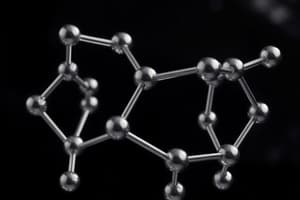Podcast
Questions and Answers
What type of organic reaction involves the replacement of one functional group with another?
What type of organic reaction involves the replacement of one functional group with another?
- Elimination reaction
- Substitution reaction (correct)
- Addition reaction
- Oxidation reaction
Which aspect is essential to understanding the behavior of organic compounds and designing new molecules?
Which aspect is essential to understanding the behavior of organic compounds and designing new molecules?
- State of matter of the compounds
- Understanding reaction mechanisms (correct)
- Molecular weight of the compounds
- Color of the compounds
In which industry are antibiotics, pain relievers, and cancer treatments often derived from organic compounds?
In which industry are antibiotics, pain relievers, and cancer treatments often derived from organic compounds?
- Automotive
- Construction
- Cosmetics
- Pharmaceuticals (correct)
What do organic compounds serve as in materials science?
What do organic compounds serve as in materials science?
Which area utilizes pesticides, herbicides, and fertilizers derived from organic compounds?
Which area utilizes pesticides, herbicides, and fertilizers derived from organic compounds?
What can be used as renewable energy sources and are derived from organic compounds?
What can be used as renewable energy sources and are derived from organic compounds?
What is the main focus of organic chemistry?
What is the main focus of organic chemistry?
Which of the following is NOT a unique characteristic of carbon?
Which of the following is NOT a unique characteristic of carbon?
What are functional groups in organic compounds?
What are functional groups in organic compounds?
What type of bonds does carbon primarily form with other elements?
What type of bonds does carbon primarily form with other elements?
Which functional group contains compounds with delocalized π electrons?
Which functional group contains compounds with delocalized π electrons?
Which functional group is characterized by acidic compounds containing carboxyl groups?
Which functional group is characterized by acidic compounds containing carboxyl groups?
Study Notes
Exploring the World of Organic Chemistry
Organic chemistry, a branch of chemistry, deals with the study of carbon-based compounds, specifically those containing carbon-hydrogen (C-H) bonds and other carbon-containing functional groups. These substances are ubiquitous in our world, found in everything from medicines to plastics to foods.
Carbon's Unique Properties
Organic chemistry explores carbon's remarkable ability to form strong bonds, creating an immense variety of molecules with diverse structures and properties. Carbon's unique characteristics include:
- Tetravalency: Carbon can form four chemical bonds with other atoms.
- Hybridization: Carbon's bonding properties can change based on the hybridization of its atomic orbitals.
- Covalent bonding: Carbon forms covalent bonds with other elements, creating stable molecules with specific structures.
Functional Groups
Organic compounds contain functional groups, which are specific groups of atoms within a molecule that give the compound its unique chemical properties. Some common functional groups include:
- Alkyl: Methyl, ethyl, and other groups containing single bonds.
- Aromatic: Benzene and other compounds with delocalized π electrons.
- Alkenes and alkynes: Double and triple bonds, respectively.
- Halogenated: Compounds containing halogens, such as chlorine and bromine.
- Carboxyl: Acidic compounds containing carboxyl (-COOH) groups.
- Amine: Basic compounds containing amine (-NH2) groups.
Synthesis and Reaction Mechanisms
Organic chemists are adept at designing and synthesizing new molecules through various chemical reactions. Some common organic reactions include:
- Substitution reactions: Replacement of one functional group with another.
- Oxidation and reduction reactions: Addition or removal of electrons.
- Elimination reactions: Removal of functional groups.
- Addition reactions: Combining two molecules with the formation of a new bond.
Understanding the reaction mechanisms of these processes is essential to understanding the behavior of organic compounds and designing new molecules with specific properties.
Applications in Everyday Life
Organic chemistry plays a vital role in many industries and aspects of our lives, including:
- Pharmaceuticals: Drugs, including antibiotics, pain relievers, and cancer treatments, are often derived from organic compounds.
- Materials Science: Organic compounds are the building blocks of plastics, rubbers, and other materials.
- Agriculture: Pesticides, herbicides, and fertilizers are often derived from organic compounds.
- Energy Production: Biomass and biofuels derived from organic compounds can be used as renewable energy sources.
Organic chemistry continues to be an ever-evolving field, with new discoveries and applications constantly emerging. Understanding the principles and applications of organic chemistry can help us better appreciate the chemistry that surrounds us every day.
Studying That Suits You
Use AI to generate personalized quizzes and flashcards to suit your learning preferences.
Description
Dive into the world of organic chemistry, where carbon's unique properties, functional groups, synthesis, and reaction mechanisms are explored. Discover how organic chemistry impacts various industries from pharmaceuticals to materials science and agriculture.




